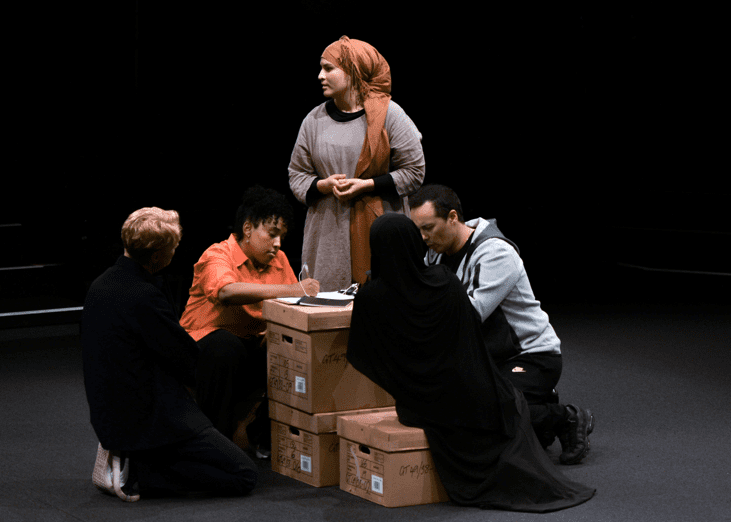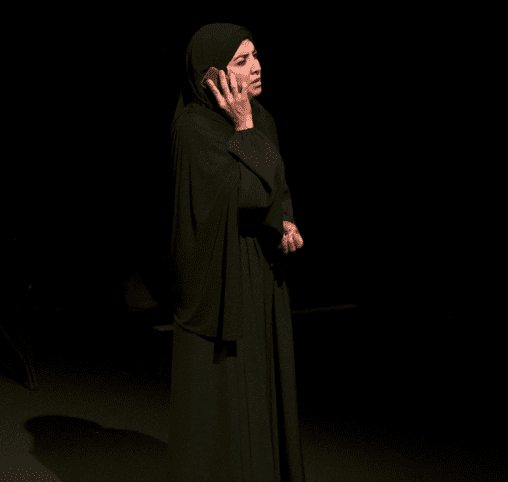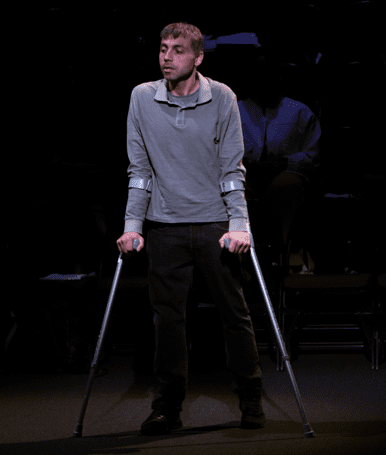THERE is a scene in the second half of Grenfell: In the Words of Survivors when Rabia Yahya is trying to get out of the burning building.
She wears a hijab, is pregnant and has three little children with her as thick black smoke is coming up the stairwell and filling the landing outside.
In the first half of the play, Houda Echouafni introduces herself: “I play Rabia Yahya, who lived on the 18th floor in flat 152 – so on the same side of the building as Antonio and Natasha and Abdul Aziz. She lived there with her husband Bellal and their three children.”
This has been preceded by other introductions. There is a real community spirit in Grenfell, with sharing of food and in looking after children.
Joe Alessi says: “I play Antonio Roncolato, who lived with his son in flat 72 on the 10th floor – so the flat that is directly below Natasha’s.”

Pearl Mackie tells the audience, seated in a rectangular configuration around the sparse stage at the Dorfman Theatre at the National: “I play Natasha who lived with her family in flat 82, on the 11th floor of Grenfell Tower. My words are taken from interviews with Natasha, and with her consent.”
We know that Rabia managed to get out, because the drama is based on the accounts of survivors, but watching the play brings home the horror of what happened six years ago when 72 people died. It gets to the deeper truth of the night of the inferno in west London and the underlying causes in a way that is more heartwrenching than a TV documentary or an official government inquiry.
Gaz Choudhry says: “I play Maher Khoudair, who lived in flat 64 on the ninth floor – so in a one-bedroom flat… when he was interviewed, Maher spoke in Arabic but I will be speaking in English. Also, Maher uses crutches to walk because of his disability.”

More than 70 residents were injured, some badly, but 223 escaped. More would have got out alive had the London Fire Brigade not given a “stay put” advice to people to remain in their apartments. By the time the advice changed to “get out”, it was too late for many. What the fire brigade had not realised was that the cladding on the outside of the building was highly inflammable.
Some of the information about the cladding was a bit too technical for me. But it was used, even though the manufacturers knew it had failed laboratory tests. The accusation is that they were driven by greed and wanted to make as much profit as possible. This is somewhat like the Post Office scandal. Why the culprits are not in prison is a wonder.
There was a third portion to the play, when the audience saw interviews on screen with actual survivors. Perhaps the former residents of Grenfell had to be given their say, but I would have preferred the evening to have ended with the second half. When the play itself is so eloquent in the telling of that night to remember, there was no need to include the testimony of actual survivors.
What surprised me is that mobiles phones continued to work from inside the building despite the heat. Some people watching on television could see Grenfell burning both on their screen and in front of their eyes. That must have been a surreal experience.
For example, this is Rabia’s Moroccanorigin husband, Bellal, who wasn’t at home: “The BBC News popped up. I could see live footage of the fire. It was hard to register that it was our home, this was our building on the TV, covered in fire, and it was the same place my wife and kids were. I was horrified. And it was worse because I couldn’t get there.”

The play is based on interviews done by South African-born Gillian Slovo, who has lived in England since 1964.
In her introduction, she confirms how the fire began. “In the early hours of June 14, 2017, a resident of flat 16 telephoned 999 to tell them his fridge had caught fire. The resident then did everything right – he got all the occupants of his flat, and his floor, out of the building. Four fire engines were also quickly on the scene. Everybody assumed the fire would soon be out. There had, after all, been previous fires in Grenfell and all of them had been extinguished without loss of life.
“But this time was different. The fire, which had leaked through the window of flat 16, began to climb up the building. So rapidly did it move that within 20 minutes, one whole side of the 24-floor tower was alight. The fire didn’t stop there. It crossed the roof and spread down the opposite side.”
Slovo adds that the government inquiry into Grenfell “had uncovered an astonishing catalogue of errors. The refurbishment of Grenfell Tower that was completed in 2016, a year before the fire, had turned a previously non-inflammable concrete building into a graveyard.”
She feels that after the fire, the voices of those who had suffered most were absent. “This is why I, and the National Theatre, set out to produce this play. Because we wanted to let the words of the survivors and bereaved ring out on a public stage. This is a verbatim play, which means it is based on the words from interviews I have made, along with extracts from the inquiry or from the public record.”
A fire can mean different things in different contexts. In a traditional Hindu wedding, it acts as the witness. On the holiday island of Rhodes in Greece, tourists are being moved away from wildfires. Fires can cleanse and destroy, and they can be difficult to control.
The Fire Next Time by James Baldwin was first published in 1963 amid the emerging US civil rights movement. The work explored religion and racial injustice in mid-century America. There is a line at the start about the destructive nature of fire: “God gave Noah the rainbow sign, no more water but fire next time.”
This is Rabia in desperate circumstances: “…then I had a bang on the door. It was my neighbour. She is saying to me, ‘There’s a fire, get the kids and get out!’ I told them, ‘no, I spoke to the fireman, they said you are fine where you are, stay put’.”
Much later she tells of two firemen knocking on her door. “I was wearing something like this (indicating her hijab) – just a plan black one. Had my pyjamas underneath and just my scarf on my head. They presumed that I didn’t speak English because I was obviously, I was wearing a scarf. English is my first language. I was born here.”
Luckily, she decided not to wait to be rescued, but brave the pitch-black darkness and the smoke. “I remember looking up at the building as soon as I got out and it was literally alight. I couldn’t see any bit of it that wasn’t on fire. Then we walked through, and I saw my son on the floor. I was running to him. But they was giving him oxygen and stuff. They, they just picked him up and put him in an ambulance and they wouldn’t let me go with him. I didn’t know if he was alive.”
Bellal continued: “I went to King’s College Hospital to see Aymen and Naila…an imam was sent to pray over Aymen, that’s how touch-and-go it was.”
This was drama unlike any other the National has put on.
Grenfell: In the Words of Survivors is on at the National Theatre until August 26
